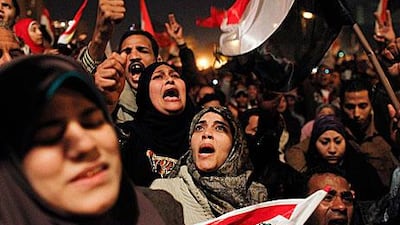CAIRO // The scene was as unexpected as it was worrying.
Looking back: Egypt's 2011
The masses that congregated at Tahrir Square became a worldwide symbol of freedom. The razor wire and walls now surrounding it tell another story.
Looking ahead: Year will define country divided on many axes. Read article
Egypt's timeline of events Read article
Asked about the troubled Egyptian economy, the recently appointed prime minister, Kamal Al Ganzouri, began to cry.
Mr Al Ganzouri, 78, told reporters in Cairo that the situation was "worse than anyone can imagine".
If the facts did not bear him out, his comments could have been mistaken for a political trick to help quell protests destabilising the country's democratic transition nine months after Hosni Mubarak was forced from power by a popular uprising. Economic data show the country on the verge of a downturn that could have lasting implications for Egypt's political future.
Tourism revenues were expected to drop by a third to about US$9 billion (Dh33bn) compared with 2010. Camel jockeys and informal tour guides at the pyramids of Giza have become so desperate for money that they have taken to blocking the entrance and demanding fees, scaring some visitors from even entering the complex.
New investments into Egypt have reversed, with $65 million flowing out of the country in the first half of this year compared with a $4.2bn inflow in the same period in 2010. The economy grew at just 1.2 per cent in 2011, down from 5.1 per cent in 2010, according to IMF data.
This is having a devastating effect on unemployment, which rose to 11.9 per cent in the third quarter, up from 8.9 per cent in the same quarter of 2010, according to Egypt's Central Agency for Public Mobilisation and Statistics. That number, which represents 3.17m people looking for a job, probably masks the true rate, because more than half of the country's economy is driven by part-time labourers who are not tracked through traditional data collection, analysts say.
Ahmed Borai, the former minister of manpower, warned this summer that "if there is no real movement to realise social justice, then we will also face the 'Revolution of the Hungry'", calling unemployment one of the worst problems in the Egyptian economy.
Moody's Investor Service, a credit agency that rates Egypt's debt, warned this month that the political uncertainty over Egypt was a "credit negative" for the country.
"Continued political instability and the transitional role of the new government suggest that financial stability and investor confidence will remain elusive," wrote Mathias Angonin, an associate analyst in Moody's sovereign rating group, in a research report. "Egypt's external payments position continues to deteriorate in the post-revolution era."
Some of the country's top businessmen have argued while the short-term economic prospects were challenging because of uncertainty, a freely democratic Egypt would provide a stronger basis for investment and growth.
"In the long term, democracy will undoubtedly be good for business, but the fact of the matter is that the economic fallout from the revolution has, so far, had a negative impact on businesses of all sizes," said Ahmed Heikal, the chairman and founder of the publicly listed private equity firm Citadel Capital.
"If we get the transition right, there will undoubtedly be a very substantial 'democracy dividend'. Democracy is fundamentally pro-competition, pro-transparency and pro-social-justice."
There is also uncertainty over what kinds of economic policies will come out of a new parliament when it convenes for the first time in March.
Islamist political groups, such as the Muslim Brotherhood-controlled Freedom and Justice Party, that have so far dominated elections have promised free-market policies.
They have little experience with running a country - much less an economy - and there are concerns that any new laws on things such as alcohol sales and Islamic banking could make Egypt less conducive to economic growth.
Mounir Fakhry Abdel Nour, the tourism minister, said that some ideas espoused by candidates for parliament about making the country more conservative could hurt tourism.

